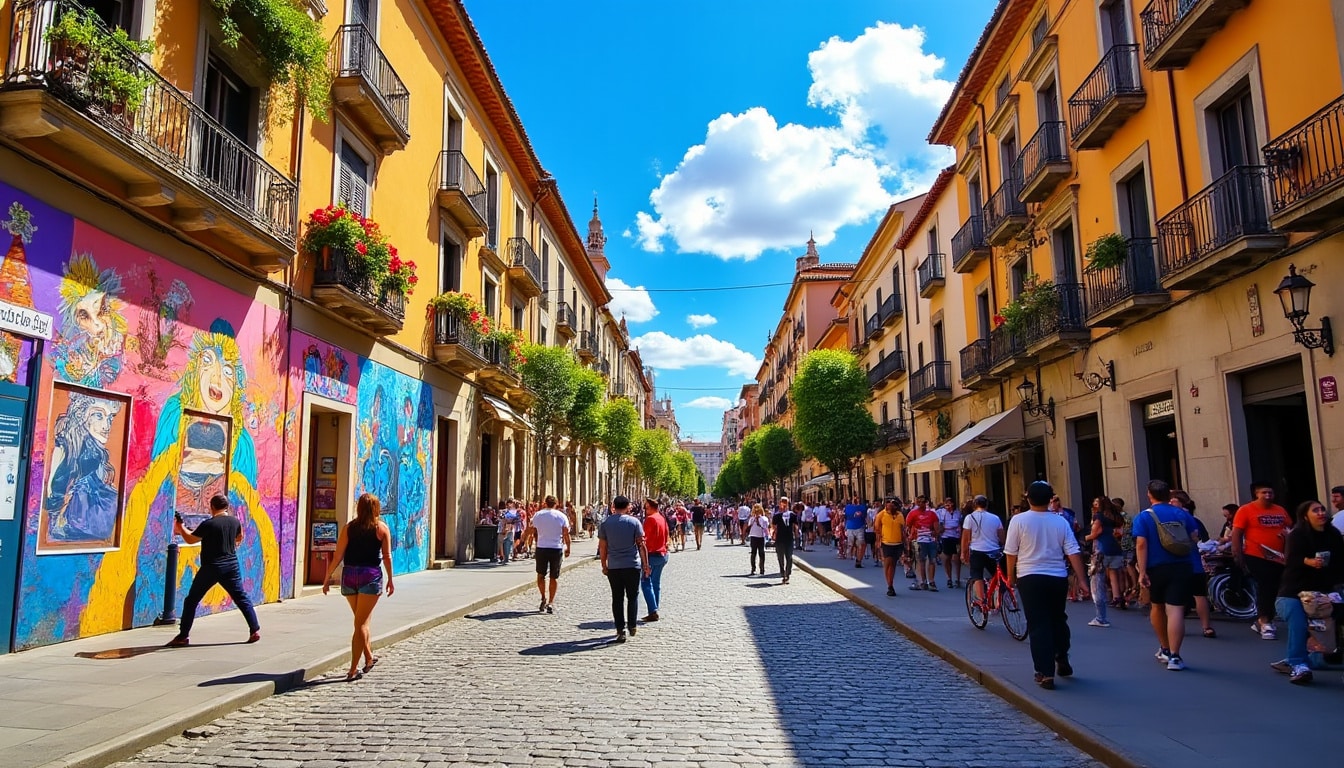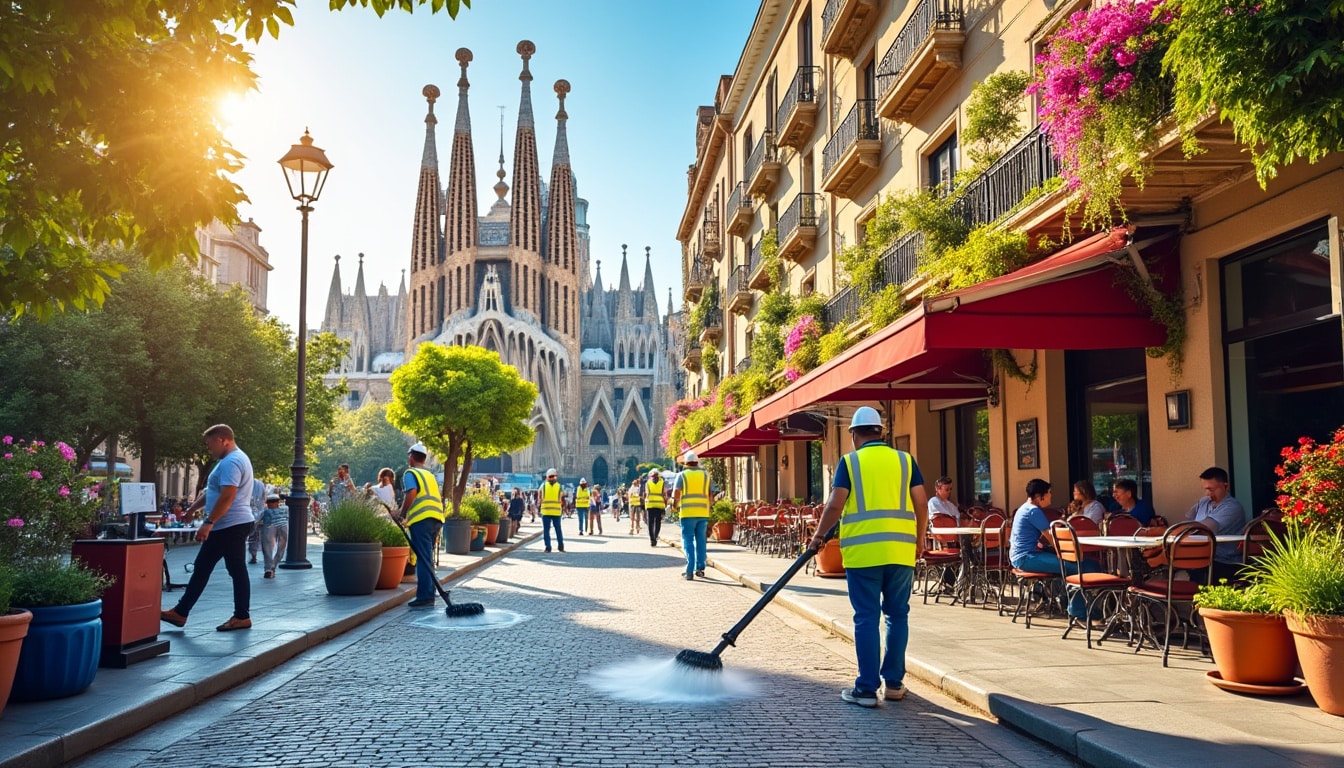Barcelona, renowned for its architectural marvels and vibrant culture, faces both praise and challenges in terms of cleanliness and hygiene. While the city strives to maintain pristine streets and public spaces, varying usage and commercial activities contribute to different cleanliness levels across the region. In this article, we delve into the city’s efforts and strategies to ensure a healthy environment, exploring everything from waste management systems to community guidelines. Together, these elements create a framework for maintaining Barcelona’s cleanliness amidst growing urban demands.
Barcelona’s Street Cleaning System: An Overview
Barcelona employs a multifaceted approach to street cleaning, adapting to the unique requirements of each area. The city’s cleaning teams utilize various methods to ensure hygiene across busy and less frequented streets. Manual sweep work involves cleaning teams actively sweeping and maintaining street cleanliness. Mechanical sweep work employs small sweeper trucks equipped to brush and vacuum dirt effectively. These technologies, when combined, enhance the city’s ability to manage its waste and cleanliness efficiently.
Moreover, water cleaning using pressurized non-potable water is employed. This approach is particularly valuable in removing stubborn dirt and grime, especially in areas where rainwater is insufficient. Each of these methods is tailored to traffic patterns, foot traffic, and the nature of the surrounding commercial activity, ensuring that the cleaning resources are deployed most effectively.

Collaboration between technology and human resources ensures that Barcelona remains a pleasant city for both residents and tourists. Regular maintenance—including frequent bin emptying and employing individualized cleaning strategies—helps tackle the urban refuse produced by the daily hustle and bustle of life in this cosmopolitan city.
Community Engagement in Maintaining Cleanliness
Local government initiatives endeavor to engage the community in maintaining cleanliness. Residents and tourists alike are encouraged to use the 25,229 bins placed strategically throughout the city. Double bins, boasting a larger capacity, are positioned in the busiest pedestrian areas to accommodate higher waste generation. With Copenhagen being synonymous with green-friendly aesthetics, Barcelona stands as a similar beacon in the Mediterranean area, structured to handle large volumes of paper waste.
- 🚮 Use designated bins for waste disposal to prevent littering.
- ♻️ Participate in recycling programs to reduce waste volume.
- 🔥 Avoid disposing of burning items such as cigarettes carelessly.
- 🌿 Contribute by keeping personal areas clean to enhance community efforts.
Corrective actions, such as the repair and upgrade of older bins, combined with systematic cleaning schedules, ensure that these facilities are well-maintained. The enforcement of fines for improper waste disposal and public urination acts as a deterrent, emphasizing the city’s zero-tolerance policy for any activity that may degrade public hygiene.
Community support is vital for upholding Barcelona’s environmental standards. By instilling a sense of shared responsibility, both residents and visitors can actively contribute to the city’s overall cleanliness, ensuring it remains a top destination.
Waste Management Techniques in Barcelona
Waste management in Barcelona involves a complex infrastructure designed to cope with the demands of a bustling urban environment. Bins are emptied multiple times a day, especially in central areas where foot traffic is intense. The city has established robust systems for sorting and processing waste, ensuring the smooth flow of urban life without compromising cleanliness.
Residents can benefit from comprehensive waste sorting facilities that handle different types of refuse, from organic waste to recyclables. With over 500 double bins distributed in key locations, the capacity for waste collection is substantial, ensuring minimal overflow and inconvenience.
| Type | Description | Frequency | Emoji |
|---|---|---|---|
| Manual Sweep | Active street sweeping by personnel | Daily | 🧹 |
| Mechanical Sweep | Small sweeper trucks with brushes | Weekly | 🚛 |
| Water Cleaning | Pressurized water wash | As required | 💧 |
The city also incentivizes organic waste composting, promoting a circular economy that benefits agriculture and reduces landfill dependency. As the community becomes more involved in waste reduction and segregation, Barcelona can effectively manage its environmental impact and maintain its reputation as a clean and eco-conscious city.
Public Spaces: Maintenance and Challenges
Parks, squares, and beaches make up a substantial portion of Barcelona’s allure, drawing tourists and locals alike. To maintain these spaces, city authorities invest significantly in cleanliness and infrastructure. Parks are equipped with an ample number of bins, ensuring visitors have convenient access to disposal options.
However, the challenge remains in popular areas where foot traffic can lead to quick degradation of cleanliness if not managed diligently. Frequent campaigns are carried out to ensure visitors are aware of waste disposal protocols, and staff are regularly seen working alongside these spaces.
- 🌳 Maintain natural beauty through regular upkeep.
- 🏖️ Encourage beach cleanliness by providing accessible waste disposal options.
- ✨ Facilitate community clean-up days to engage local involvement.
- 🚶♂️ Address high-traffic zones proactively to sustain cleanliness.
Moreover, recent developments in smart technology are being trialed to assess public-space waste management, aiming for more streamlined waste collection and monitoring. Such innovations, alongside traditional methods, highlight Barcelona’s intent to blend tradition with technology, ensuring its public spaces remain pristine.
Regulations and Guidelines: Keeping Barcelona Hygienic
City authorities implement clear guidelines to preserve hygiene, with strict penalties for breaches. It is forbidden to litter streets with grease, gum, or other waste, and fines are imposed for violators. These regulations are part of a broader effort to instill civic responsibility among the populace.
Specific stipulations govern the washing of vehicles and animals, ensuring that such activities do not disturb public areas or occur at inappropriate times. In residential areas, guidelines are in place for watering plants and cleaning to maintain harmony and peace.
Additionally, tourists are educated on proper waste disposal methods and adherence to local hygiene practices, reinforcing the importance of maintaining the city’s cleanliness. Businesses like cafes and restaurants partner with waste management services to ensure prompt waste disposal and compliance with health standards.
- 🚫 Do not litter with grease, gum, or cigarette butts.
- 🐾 Avoid leaving pet feces in public spaces.
- 🚿 No public cleaning of vehicles or animals.
- ❌ Respect local regulations on public cleanliness.
These measures aim to sustain an inviting atmosphere for both urban dwellers and the many tourists who flock to revel in the city’s rich cultural tapestry and exquisite architecture.
Community and Cultural Involvement
To further enhance Barcelona’s cleanliness, cultural organizations and community groups host events and initiatives promoting environmental stewardship. These efforts instill pride in both national identity and respect for the environment.
Annual festivals often incorporate elements of public well-being, showcasing a city intent on accentuating cleanliness amid celebration. As this cultural narrative intertwines with day-to-day activities, the result is a shared appreciation for the city’s cleanliness and hygiene.
Overall, maintaining cleanliness in a bustling city like Barcelona requires a concerted effort from all sectors of the community. Government policies, technological innovation, and cultural involvement collectively contribute to sustaining and beautifying this iconic city.
FAQ
- How often are the bins in Barcelona emptied?
The frequency depends on the area’s traffic; central areas see bins emptied up to twelve times a day. 🗑️ - What penalties exist for public cleanliness violations?
Fines are imposed for littering and improper disposal of waste to maintain street hygiene. 🚫 - Are there special regulations for tourists regarding cleanliness?
Yes, tourists are informed about local disposal practices and encouraged to follow guidelines to help preserve the city’s ambiance. 🌍

